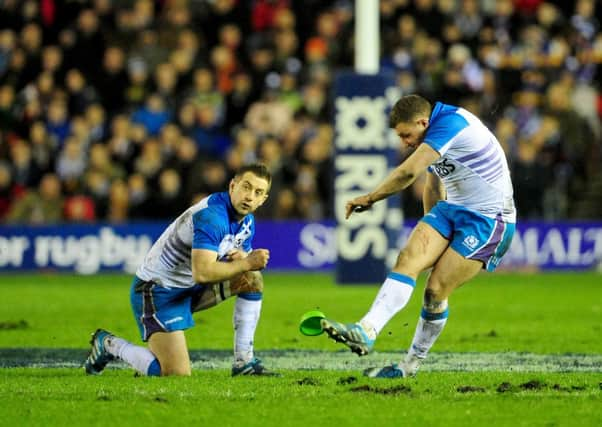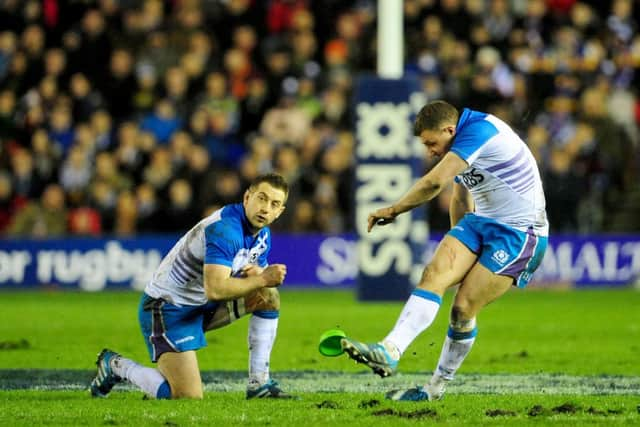Six Nations: Errors contrive to undo Scots


However, as the emotions fade, the mist clears and minds start to turn to the final match against Wales on Saturday, the Scotland squad will see both that they outshone France and sparklingly clear and frustrating reasons why they did not end up on the winning side.
Even taking into account the refereeing interpretation, which was a factor as New Zealander Chris Pollock brought a different take on how long players can wrestle for ball on the ground to encourage attack, which ultimately handed France their late match-winning penalty, this result did not hinge on one or two moments.
Advertisement
Hide AdAdvertisement
Hide AdThe hastily floated pass delivered by Rome’s hero Duncan Weir and intercepted by wing Yoann Huget in the 45th minute, turning what seemed a certain Scotland score and 21-9 lead to a precarious 17-16 advantage, was indeed the obvious defining moment, and there was a horrible link in that moment to Murrayfield’s history. Exactly 20 years before Philippe Saint-Andre, now sitting in the west stand as French coach, had similarly raced onto a pass by Gregor Townsend in the 54th minute and sprinted down the field to score a try that was to seal a 20-12 win for France. So at least Weir has a coach who knows exactly how he feels this morning.


But as game-changing as that fateful pass was, Weir and Scotland came back from it and led again. The truth is that it was one of a string of miscalculations that combined to hand victory to a stuttering French team, cheered on by one of the most voluble and colourful travelling supports witnessed at Murrayfield in some time.
The tone was set early as Richie Gray lost the kick-off when David Denton was better placed to grasp it, which led to a scrum which led to a collapse which handed scrum-half Maxime Machenaud his first penalty.
Sean Lamont foolishly strode through a ruck in front of his own posts to hand Machenaud his second penalty, Tommy Seymour and Denton collided going for the same ball, Denton lost the ball running back the restart after Stuart Hogg’s try, and that led to French attacks, and a third easy Machenaud penalty, in a period that also cost Scotland No 8 Johnnie Beattie with an injured ankle just 16 minutes in.
Costly errors. Gifts to France. Some seemed minor, such as skipper Kelly Brown foolishly advancing at a garryowen, Weir kicking straight out and two stolen lineouts but, added to the interception try, they contributed to relieving pressure on France and allowing them to stay in a game in which they were distinctly second best.
The final nail came in the final minutes as Scotland had worked their way back into a 17-16 lead, dominating possession by some distance, but, the team new to a position of leading France as the whistle beckoned, lost the momentum and accuracy to firmly grasp the victory.
Weir missed a 44-metre penalty kick, as Laidlaw had done earlier, with six minutes remaining, Ryan Wilson and Tim Swinson attacked inside the French half but were isolated and turned over, gifting France the territory to launch a final assault. And then Swinson was culpable for the ruck infringement on which referee Pollock had been strong throughout, failing to release the tackled player, gifting Jean-Marc Doussain an easy penalty in front of the posts with 90 seconds remaining that decided the result, and leaves France still with the improbable chance to win the Six Nations title at home to Ireland this weekend.
Cruel on Scotland, perhaps? But Scotland sadly had themselves to blame for defeat.
Advertisement
Hide AdAdvertisement
Hide AdThat said, one cannot provide a full picture of this absorbing Test match without explaining the wonderfully improved and bristling aspects of Scottish play that led to them dominating this match, rolling the French scrum back on its heels as it wore on, stealing an incredible eight French lineouts and winning five out of their own seven. A defensive performance with a speed and aggression that forced French runners up blind alleys and, promisingly, an attack that yielded two tries for the second Six Nations match in a row, and should have had more.
From Weir’s and Denton’s try-saving tackle on Maxime Mermoz early on, to Hamilton’s charge-down that seized the platform for Stuart Hogg’s try, there was a new sense of belief in this Scottish performance, the result perhaps of the late win in Italy, and maybe, a little, due to the presence of the 1984 Grand Slam squad in the stands 30 years on from their famous victory against France.
Ambition sparkled in the two tries. Hogg, playing advantage on a Scottish penalty on the French 22, sent up a garryowen rather than take the penalty or go for a drop-goal, and crucially chased it. Lamont did too and challenged defenders Huget and Dulin, forcing all three to crash to the ground and the ball to spill, and Hogg dived on it. There was luck, sure, as the ball could have bounced anywhere, but ambition by Hamilton and Hogg was rewarded when the television match official deemed the Scotland full-back to have touched the ball down first.
The second score was better, crafted in training and delivered clinically by the positive running of Weir, the quick, soft hands of Matt Scott – and very astute dummy run by Alex Dunbar that impeded Jules Plisson – to send Tommy Seymour sprinting to the left-hand corner.
It is fair to say that the French created few genuine try-scoring chances but, although a hotchpotch, changed side with several key players injured, they still had enviable world-class performers strung across the team and, led by intuitive runner Brice Dulin at full-back, built several dangerous attacks from their own 22 to a series of pummellings inside the Scots 22. Yet, they only glimpsed the Scottish line when Huget was gifted the ball by Weir.
That is where the Scots players and supporters were left with a numbing sense of futility. They had made all the running, had taken the impressive French pack on, lock Jim Hamilton leading a storming forward effort in which the front row more than matched the French, Scott Lawson outshone the new French hooker Brice Mach, Ryan Grant had his best game for a while and Geoff Cross delivered another hook to the jaw of critics who have written him off.
Richie Gray’s workrate, previously questioned, was top-notch in the tight and loose – not the 20-yard breaks that made him a young star, but the real, gritty, five-yard charges that earn his team-mates’ respect – and the back row stuck to their task resolutely in maintaining a high tempo and accuracy to their bruising work at the breakdown and around the field. The backs shut the powerful and skilful French attack down and varied their own attack well, Hogg, often swapping with Weir at stand-off, one of several Scots who could have been named Man of the Match.
With finishers Tim Visser and Sean Maitland injured, Ross Rennie still working his way back and Euan Murray watching from the stand, losing on-form duo Beattie and Sean Lamont, the latter to knee ligament damage after half an hour, only stiffened the Scottish challenge of making the whole add up to more than the sum of their parts.
Advertisement
Hide AdAdvertisement
Hide AdThey very nearly did it and deserve real credit for a performance full of Test-match quality, but will look back on the string of errors and know that this was a rare Test victory over the French that they threw away.
Scorers: Scotland: Tries - Hogg, Seymour; Pen - Weir; Cons - Laidlaw 2. France: Try - Huget; Pens - Machenaud 3, Dussain; Con - Machenaud.
Scotland: S Hogg; T Seymour, A Dunbar, M Scott, S Lamont; D Weir, G Laidlaw; R Grant, S Lawson, G Cross, R Gray, J Hamilton, J Beattie, K Brown (capt), D Denton. Subs: R Wilson for Beattie 17mins, M Evans for Lamont 30, R Ford for Lawson 51, T Swinson for Hamilton 69.
France: NB Dulin; Y Huget, M Bastareaud, M Mermoz, M Medard; J Plisson, M Machenaud; T Domingo, B Mach, N Mas, P Pape (capt), Y Maestri, S Vahaamahina, A Lapandry, D Choully. Subs: R Tales for Plisson 47mins, R Slimani for Mas, A Flanquart for Maestri, both 60, A Claasens for Vahaamahina 67, G Fickou for Bastareaud, V Debaty for Domingo 69, J-M Doussain for Machenaud 75.